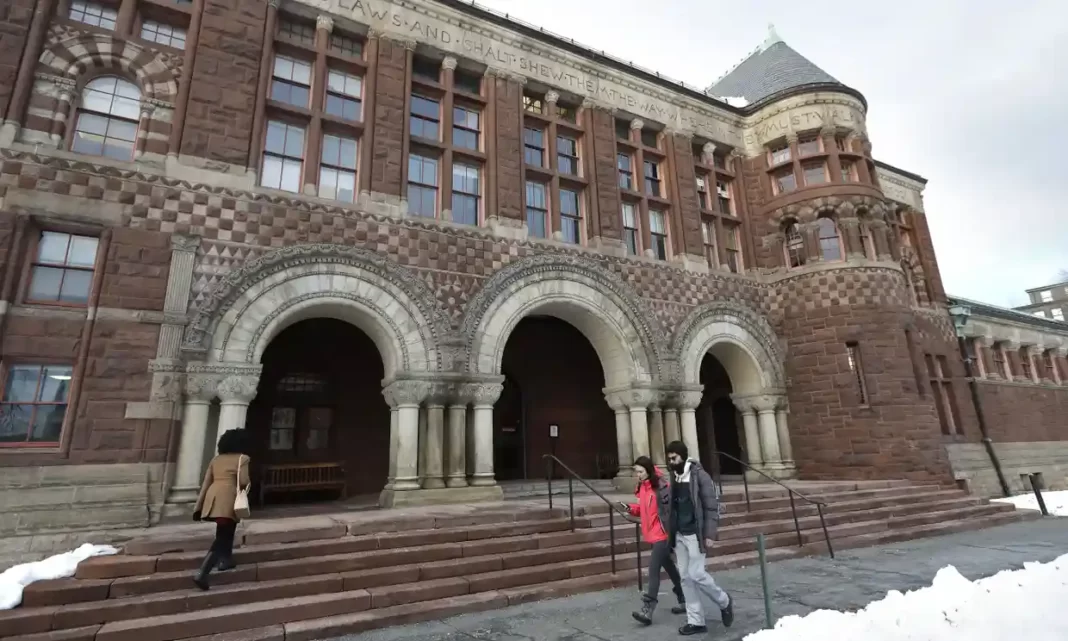Both law schools say US News & World Report’s annual rankings are in conflict with commitments to diversity and affordability
In the most dramatic rebuke of the US News & World Report’s colleges and universities rankings to date, Yale and Harvard announced on Wednesday they will stop participating in the magazine’s law school rankings, citing frustrations with the list’s methodology.
“The US News rankings are profoundly flawed – they disincentivize programs that support public interest careers, champion need-based aid and welcome working-class students into the profession,” Heather Gerkin, dean of Yale Law School, wrote in a statement on Wednesday. “We have reached a point where the rankings process is undermining the core commitments of the legal profession.”
In his statement, John Manning, dean of Harvard Law School, said: “It has become impossible to reconcile our principles and commitments with the methodology and incentives the US News rankings reflect.”
The US News rankings, used by prospective students, parents and employers looking to determine the quality of schools, has already been under heavy scrutiny this year, with some questioning the legitimacy of the list.
On Thursday, the law school at the University of California, Berkeley, joined the law programs at Harvard and Yale in pulling out of the rankings over concerns that they punish efforts to attract students from a broad range of backgrounds.
Berkeley law school dean Erwin Chemerinsky wrote in a letter published online Thursday that there was no benefit to participating in the rankings that outweighs the costs.
In February, a Columbia professor accused the university of submitting inaccurate data to the magazine in order to boost its placement on the list. Columbia admitted to the errors and said it would not submit data to the rankings for the year. After using their own calculations, in part using federal data, US News ranked Columbia as 18th – a dramatic drop down from second in the previous year.
The magazine has been releasing an annual list of the best law schools since 1990, using selectivity, school resources and employment outcomes, among other things, to compile the list. Yale has consistently ranked as the top law school since the list debuted, while Harvard has been in the top five. Law schools submit data to US News & World Report for its rankings.
Gerkin, who noted that the magazine is for-profit, said that law school deans have made repeated calls for US News to change their methodology, but the magazine still “applies a misguided formula that discourages law schools from doing what is best for legal education”.
The rankings, Gerkin argues, have discouraged law schools from providing support for students who are seeking public interest careers. Students who have received public interest fellowships from the school or are pursuing other graduate degrees are “effectively classified as unemployed” and negatively affect a school’s ranking. US News also does not calculate the existence of loan forgiveness programs that target individuals who work in public interest jobs – working for the government or non-profit organizations – when calculating how much debt students graduate with.
“That backward approach discourages law schools throughout the country from supporting students who dream of a service career,” she said.
Because of its emphasis on selectivity, specifically the LSAT and GPA scores of admitted students, schools are incentivized to turn away promising students who may not have had the resources to participate in test prep courses, Gerkin said. Schools instead are encouraged to compete for top-scoring students with merit-based aids that do not target those who need financial aid most.
Manning echoed this sentiment in his own statement, which was released shortly after Gerkin’s.
“Though [Harvard and Yale] have each resisted the pull toward so-called merit aid, it has become increasingly prevalent, absorbing scarce resources that could be allocated more directly on the basis of need,” he wrote.
Manning also noted that while calculating the amount of debt students of a law school hold can be helpful, instead of giving more financial aid, schools can admit more students who do not need aid in the first place to lower the appearance of how much debt their students hold.
In response to the announcement of both schools, Eric Gertier, CEO of US News, told CNN that the magazine will “continue to fulfill our journalistic mission of ensuring that students can rely on the best and most accurate information in making [a] decision”.
“As part of our mission, we must continue to ensure that law schools are held accountable for the education they will provide to these students and that mission does not change with this recent announcement,” he said.
It is unclear whether other law schools are considering following Harvard and Yale’s lead. Stanford Law School, current ranked No 2, told Reuters that the school is giving “careful thought” to the matter.


